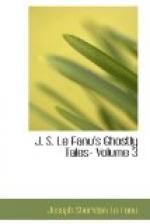There was an old fellow and his wife (an ancient dame,) who lived at the other side of the lake, on the old territories of the Feltrams, and who, from some tradition of loyalty, perhaps, were fond of poor Philip Feltram. They lived somewhat high up on the fells—about as high as trees would grow—and those which were clumped about their rude dwelling were nearly the last you passed in your ascent of the mountain. These people had a multitude of sheep and goats, and lived in their airy solitude a pastoral and simple life, and were childless. Philip Feltram was hardy and active, having passed his early days among that arduous scenery. Cold and rain did not trouble him; and these people being wealthy in their way, and loving him, would be glad to find him employment of that desultory pastoral kind which would best suit him.
This vague idea was the only thing resembling a plan in his mind.
When Philip Feltram came to Mrs. Julaper’s room, and told her that he had made up his mind to leave the house forthwith—to cross the lake to the Cloostedd side in Tom Marlin’s boat, and then to make his way up the hill alone to Trebeck’s lonely farmstead, Mrs. Julaper was overwhelmed.
“Ye’ll do no such thing to-night, anyhow. You’re not to go like that. Ye’ll come into the small room here, where he can’t follow; and we’ll sit down and talk it over a bit, and ye’ll find ’twill all come straight; and this will be no night, anyhow, for such a march. Why, man,’twould take an hour and more to cross the lake, and then a long uphill walk before ye could reach Trebeck’s place; and if the night should fall while you were still on the mountain, ye might lose your life among the rocks. It can’t be ’tis come to that yet; and the call was in the air, I’m told, all yesterday, and distant thunder to-day, travelling this way over Blarwyn Fells; and ’twill be a night no one will be out, much less on the mountain side.”
CHAPTER IX
The Crazy Parson
Mrs. Julaper had grown weather-wise, living for so long among this noble and solitary scenery, where people must observe Nature or else nothing—where signs of coming storm or change are almost local, and record themselves on particular cliffs and mountain-peaks, or in the mists, or in mirrored tints of the familiar lake, and are easily learned or remembered. At all events, her presage proved too true.
The sun had set an hour and more. It was dark; and an awful thunder-storm, whose march, like the distant reverberations of an invading army, had been faintly heard beyond the barriers of Blarwyn Fells throughout the afternoon, was near them now, and had burst in deep-mouthed battle among the ravines at the other side, and over the broad lake, that glared like a sheet of burnished steel under its flashes of dazzling blue. Wild and fitful blasts sweeping down the hollows and cloughs of the fells of Golden Friars agitated the lake, and bent the trees low, and whirled away their sere leaves in melancholy drift in their tremendous gusts. And from the window, looking on a scene enveloped in more than the darkness of the night, you saw in the pulsations of the lightning, before “the speedy gleams the darkness swallowed,” the tossing trees and the flying foam and eddies on the lake.




